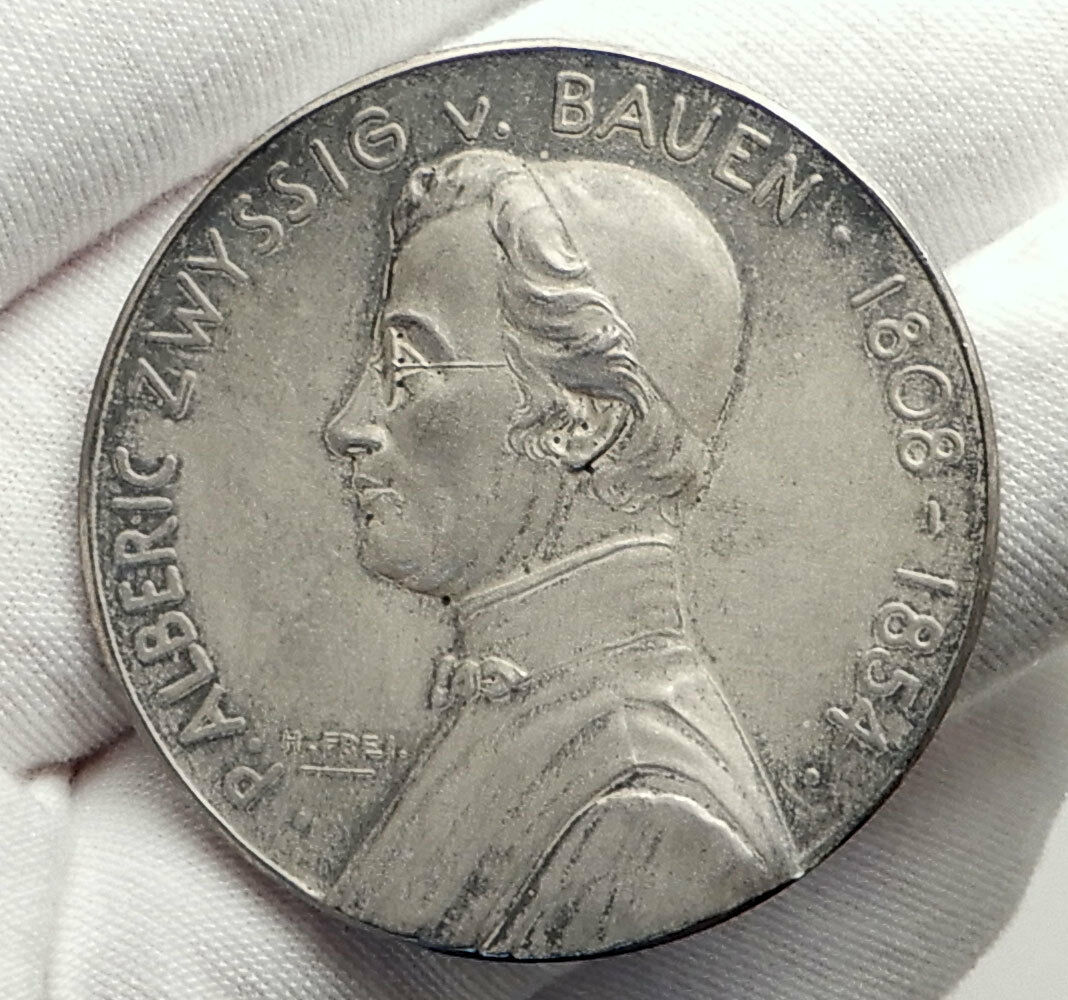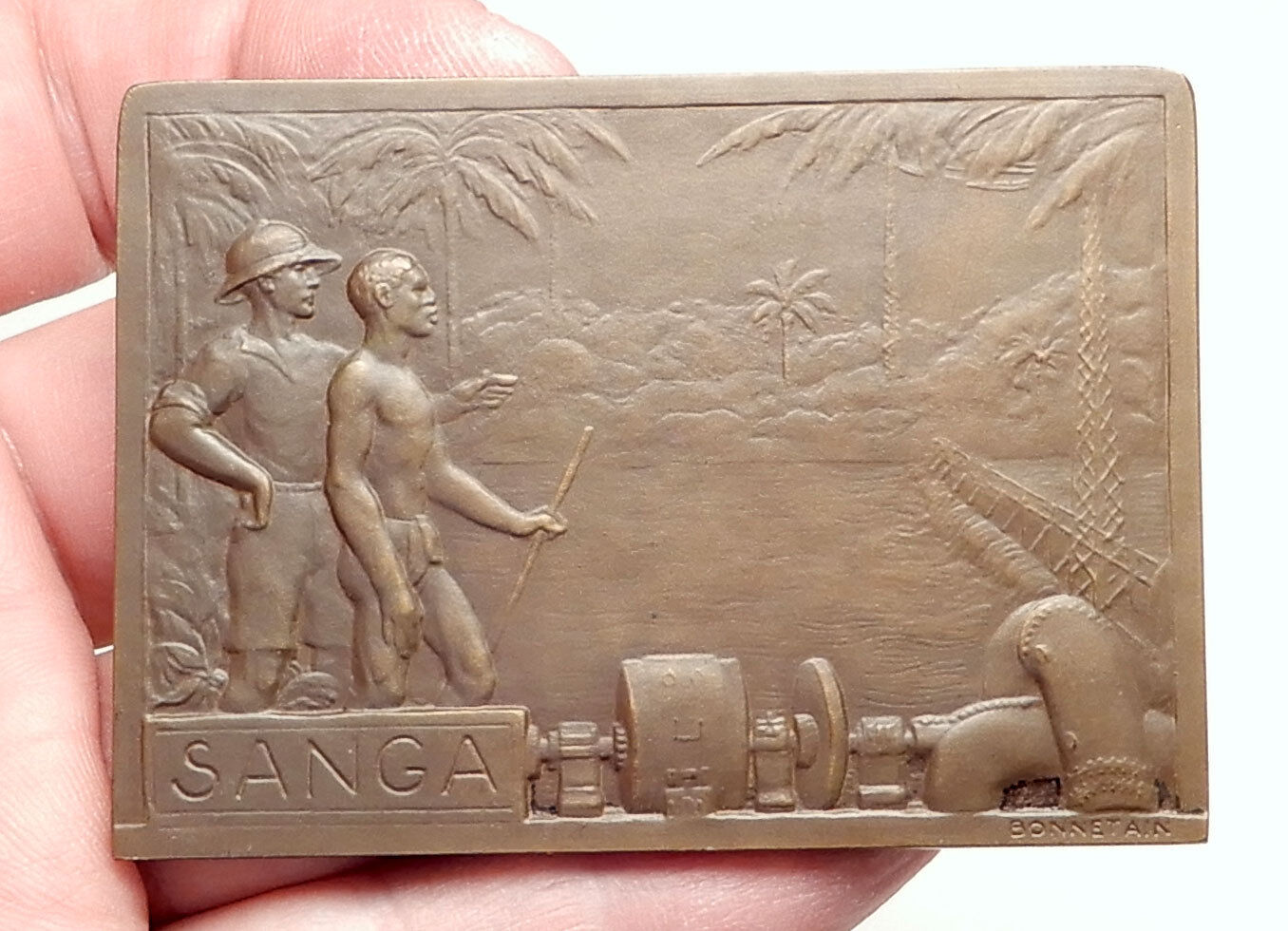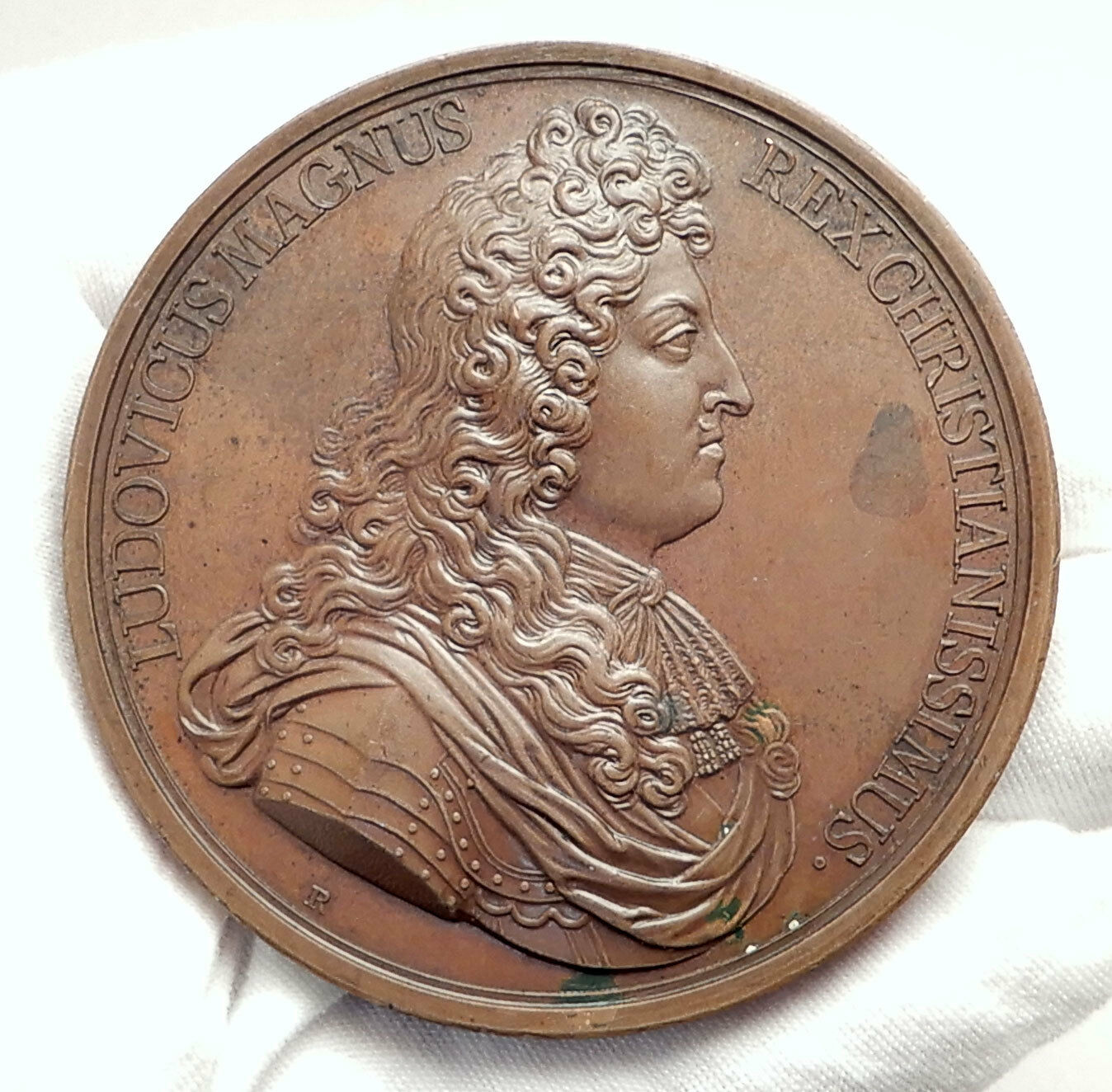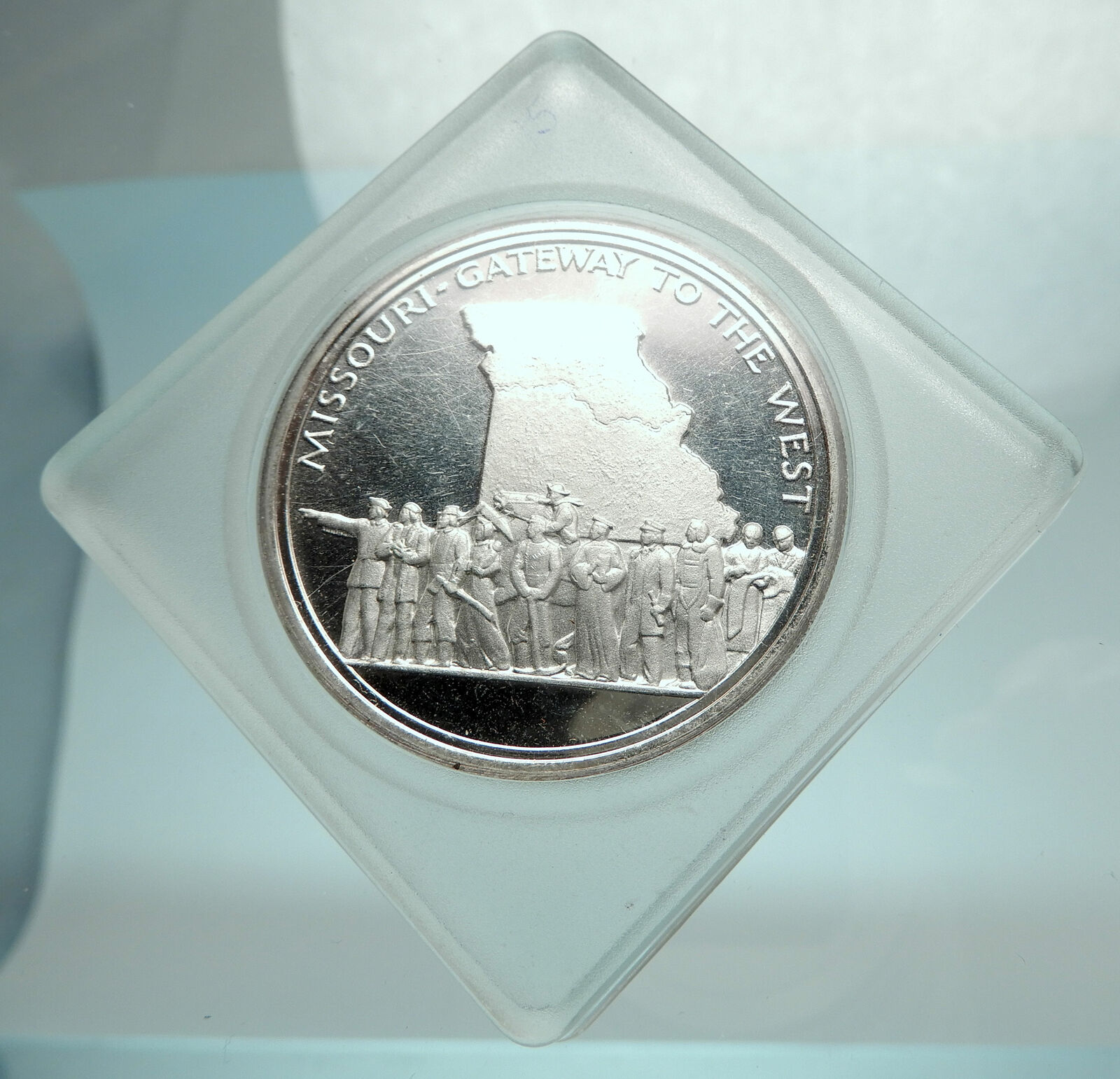|
France – Charles du Fresne, sieur du Cange
Monument of Dufresne Du Cange at the René Goblet Square, Amiens
1849 Bronze Medal 61mm (105.7 grams)
Pedigree / Provenance: Ex Schulman Gallery
Bust of Charles du Fresne, sieur du Cange right.
Statue of Charles du Fresne, sieur du Cange facing.
You are bidding on the exact item pictured, provided with a Certificate of Authenticity and Lifetime Guarantee of Authenticity.
 Charles du Fresne, sieur du Cange or Du Cange (December 18, 1610 in Amiens – October 23, 1688 in Paris, aged 77) was a distinguished philologist and historian of the Middle Ages and Byzantium. Charles du Fresne, sieur du Cange or Du Cange (December 18, 1610 in Amiens – October 23, 1688 in Paris, aged 77) was a distinguished philologist and historian of the Middle Ages and Byzantium.
Educated by Jesuits, du Cange studied law and practiced for several years before assuming the office of Treasurer of France. Du Cange was a busy, energetic man who pursued historical scholarship alongside his demanding official duties and his role as head of a large family.
Du Cange’s most important work is his Glossarium mediae et infimae Latinitatis (Glossary of medieval and late Latin, Paris, 1678). This work, together with a glossary of medieval and late Greek that he published ten years later, has gone through numerous editions and revisions and is still consulted frequently by scholars today. Du Cange’s pioneering work distinguished medieval Latin and Greek from their earlier classical forms, marking the beginning of the study of the historical development of languages.
Du Cange mastered languages in order to pursue his main scholarly interests, medieval and Byzantine history. He corresponded voluminously with his fellow scholars. His great historical and linguistic knowledge was complemented by equally deep learning in archaeology, geography and law. In addition to his glossaries, he produced important new editions of Byzantine historians and a number of other works. His extensive history of Illyria was not published until 1746 by Joseph Keglevich, who partially corrected it.
Du Cange is one of the historians Edward Gibbon cites most frequently in his Decline and Fall of the Roman Empire. In one footnote he calls du Cange “our sure and indefatigable guide in the Middle Ages and Byzantine history.”
Works
- Du Fresne Du Cange, Charles (1680). Historia Byzantina duplici commentario illustrata (in Latin). Paris: Louis Billaine.
- Du Cange, et al., Glossarium mediae et infimae Latinitatis, Niort: L. Favre, 1883-1887 (10 vol.). searchable full-text online edition, by the École nationale des chartes
- Glossarium mediae et infimae Latinitatis images online on the French National Library’s website
- Glossarium mediae et infimae Latinitatis 7-volume (1840-1850) on the Stanford University Library website
- Glossarium ad scriptores mediae et infimae Graecitatis Glossarium ad scriptores mediae et infimae Graecitatis from the Digital Library of Modern Greek Studies “Anemi”, University of Crete, Greece
- Les Familles d’Outremer at the Internet Archive
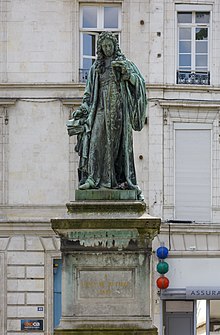
Monument of Dufresne Du Cange at the René Goblet Square, Amiens
.JPG/270px-0_Amiens_-_Place_du_Don_-_Cathédrale_(1).JPG) Amiens is a city and commune in northern France, 120 km (75 mi) north of Paris and 100 km (62 mi) south-west of Lille. It is the capital of the Somme department in Hauts-de-France. The city had a population of 136,105 according to the 2006 census. Amiens is a city and commune in northern France, 120 km (75 mi) north of Paris and 100 km (62 mi) south-west of Lille. It is the capital of the Somme department in Hauts-de-France. The city had a population of 136,105 according to the 2006 census.
It has one of the biggest university hospitals in France with a capacity of 1,200 beds.
Amiens Cathedral, the tallest of the large, classic, Gothic churches of the 13th century and the largest in France of its kind, is a World Heritage Site. The author Jules Verne lived in Amiens from 1871 until his death in 1905, and served on the city council for 15 years. During December, the town hosts the largest Christmas market in northern France. Amiens is known for a few local foods, including “macarons d’Amiens”, almond paste biscuits; “tuiles amienoises”, chocolate and orange curved biscuits; “pâté de canard d’Amiens”, duck pâté in pastry; “la ficelle Picarde”, an oven-baked cheese-topped crêpe; and “flamiche aux poireaux”, a puff pastry tart made with leeks and cream.
  France, officially the French Republic (French: République française), is a sovereign state comprising territory in western Europe and several overseas regions and territories. The European part of France, called Metropolitan France, extends from the Mediterranean Sea to the English Channel and the North Sea, and from the Rhine to the Atlantic Ocean. France spans 640,679 square kilometres (247,368 sq mi) and has a total population of 67 million. It is a unitary semi-presidential republic with the capital in Paris, the country’s largest city and main cultural and commercial centre. The Constitution of France establishes the state as secular and democratic, with its sovereignty derived from the people. France, officially the French Republic (French: République française), is a sovereign state comprising territory in western Europe and several overseas regions and territories. The European part of France, called Metropolitan France, extends from the Mediterranean Sea to the English Channel and the North Sea, and from the Rhine to the Atlantic Ocean. France spans 640,679 square kilometres (247,368 sq mi) and has a total population of 67 million. It is a unitary semi-presidential republic with the capital in Paris, the country’s largest city and main cultural and commercial centre. The Constitution of France establishes the state as secular and democratic, with its sovereignty derived from the people.
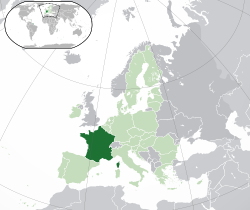
During the Iron Age, what is now Metropolitan France was inhabited by the Gauls, a Celtic people. The Gauls were conquered in 51 BC by the Roman Empire, which held Gaul until 486. The Gallo-Romans faced raids and migration from the Germanic Franks, who dominated the region for hundreds of years, eventually creating the medieval Kingdom of France. France emerged as a major European power in the Late Middle Ages, with its victory in the Hundred Years’ War (1337 to 1453) strengthening French state-building and paving the way for a future centralized absolute monarchy. During the Renaissance, France experienced a vast cultural development and established the beginning of a global colonial empire. The 16th century was dominated by religious civil wars between Catholics and Protestants (Huguenots).
France became Europe’s dominant cultural, political, and military power under Louis XIV. French philosophers played a key role in the Age of Enlightenment during the 18th century. In 1778, France became the first and the main ally of the new United States in the American Revolutionary War. In the late 18th century, the absolute monarchy was overthrown in the French Revolution. Among its legacies was the Declaration of the Rights of Man and of the Citizen, one of the earliest documents on human rights, which expresses the nation’s ideals to this day. France became one of modern history’s earliest republics until Napoleon took power and launched the First French Empire in 1804. Fighting against a complex set of coalitions during the Napoleonic Wars, he dominated European affairs for over a decade and had a long-lasting impact on Western culture. Following the collapse of the Empire, France endured a tumultuous succession of governments: the monarchy was restored, it was replaced in 1830 by a constitutional monarchy, then briefly by a Second Republic, and then by a Second Empire, until a more lasting French Third Republic was established in 1870. By the 1905 law, France adopted a strict form of secularism, called laïcité, which has become an important federative principle in the modern French society.
France reached its territorial height during the 19th and early 20th centuries, when it ultimately possessed the second-largest colonial empire in the world. In World War I, France was one of the main winners as part of the Triple Entente alliance fighting against the Central Powers. France was also one of the Allied Powers in World War II, but came under occupation by the Axis Powers in 1940. Following liberation in 1944, a Fourth Republic was established and later dissolved in the course of the Algerian War. The Fifth Republic, led by Charles de Gaulle, was formed in 1958 and remains to this day. Following World War II, most of the empire became decolonized.
Throughout its long history, France has been a leading global center of culture, making significant contributions to art, science, and philosophy. It hosts Europe’s third-largest number of cultural UNESCO World Heritage Sites (after Italy and Spain) and receives around 83 million foreign tourists annually, the most of any country in the world. France remains a great power with significant cultural, economic, military, and political influence. It is a developed country with the world’s sixth-largest economy by nominal GDP and eight-largest by purchasing power parity. According to Credit Suisse, France is the fourth wealthiest nation in the world in terms of aggregate household wealth. It also possesses the world’s second-largest exclusive economic zone (EEZ), covering 11,035,000 square kilometres (4,261,000 sq mi).
French citizens enjoy a high standard of living, and the country performs well in international rankings of education, health care, life expectancy, civil liberties, and human development. France is a founding member of the United Nations, where it serves as one of the five permanent members of the UN Security Council. It is a member of the Group of 7, North Atlantic Treaty Organization (NATO), Organisation for Economic Co-operation and Development (OECD), the World Trade Organization (WTO), and La Francophonie. France is a founding and leading member state of the European Union (EU).
|





 Charles du Fresne, sieur du Cange or Du Cange (December 18, 1610 in Amiens – October 23, 1688 in Paris, aged 77) was a distinguished philologist and historian of the Middle Ages and Byzantium.
Charles du Fresne, sieur du Cange or Du Cange (December 18, 1610 in Amiens – October 23, 1688 in Paris, aged 77) was a distinguished philologist and historian of the Middle Ages and Byzantium. 
.JPG/270px-0_Amiens_-_Place_du_Don_-_Cathédrale_(1).JPG) Amiens is a city and commune in northern France, 120 km (75 mi) north of Paris and 100 km (62 mi) south-west of Lille. It is the capital of the Somme department in Hauts-de-France. The city had a population of 136,105 according to the 2006 census.
Amiens is a city and commune in northern France, 120 km (75 mi) north of Paris and 100 km (62 mi) south-west of Lille. It is the capital of the Somme department in Hauts-de-France. The city had a population of 136,105 according to the 2006 census. 
 France, officially the French Republic (French: République française), is a sovereign state comprising territory in western Europe and several overseas regions and territories. The European part of France, called Metropolitan France, extends from the Mediterranean Sea to the English Channel and the North Sea, and from the Rhine to the Atlantic Ocean. France spans 640,679 square kilometres (247,368 sq mi) and has a total population of 67 million. It is a unitary semi-presidential republic with the capital in Paris, the country’s largest city and main cultural and commercial centre. The Constitution of France establishes the state as secular and democratic, with its sovereignty derived from the people.
France, officially the French Republic (French: République française), is a sovereign state comprising territory in western Europe and several overseas regions and territories. The European part of France, called Metropolitan France, extends from the Mediterranean Sea to the English Channel and the North Sea, and from the Rhine to the Atlantic Ocean. France spans 640,679 square kilometres (247,368 sq mi) and has a total population of 67 million. It is a unitary semi-presidential republic with the capital in Paris, the country’s largest city and main cultural and commercial centre. The Constitution of France establishes the state as secular and democratic, with its sovereignty derived from the people.


